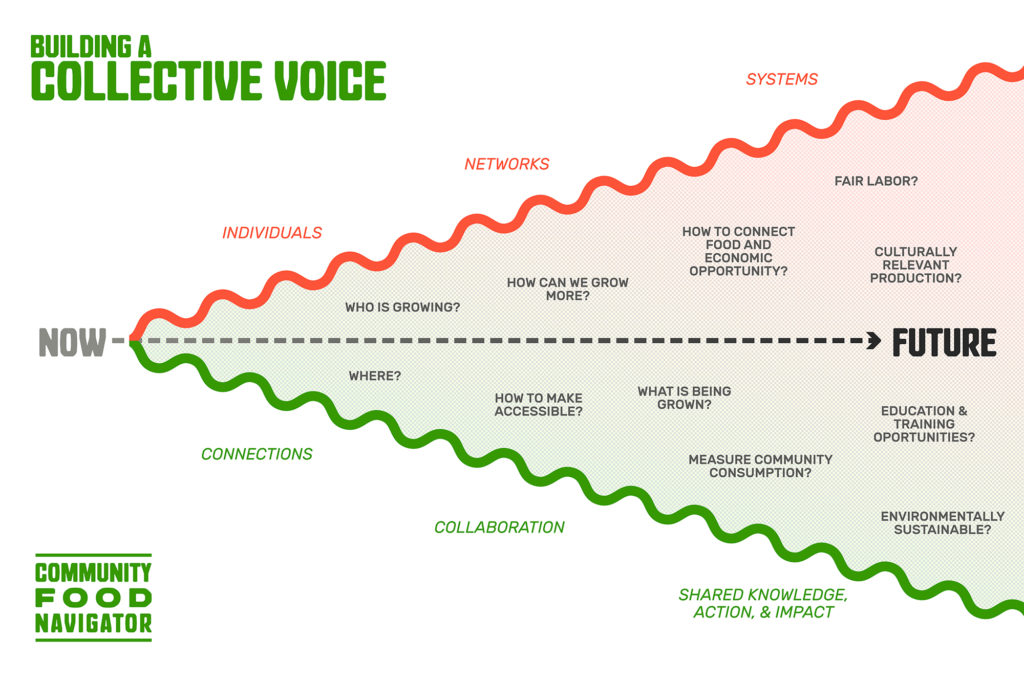
Publications & Presentations
In early 2021, the Community Food Navigator held a series of conversations and workshops designed and facilitated by ChiByDesign, and focused on growers and food producers led by or serving Black, Brown, and Indigenous communities. The findings of these conversations, compiled in a report by ChiByDesign, highlight the unmet needs and opportunities for community-led food systems, and ground this project’s vision and values. Thank you to all who participated in the workshops.
The Community Food Navigator is grateful to have participated in the 17th Annual Chicago Food Justice Summit hosted by the Chicago Food Policy Action Council.
Our session provided an update on the Community Food Navigator, including the launch of our website and a sneak peek at some of the digital tools we’re developing. The video is available to watch:
Frequently Used Terms
- BIPOC: Black, Indigenous, and People of Color
- Community Partners: General reference to all who participated in the workshops and interviews. This includes urban growers and food producers, social enterprise and small business leaders focused on community and economic development, people working in policy, human services, food security, public health, academia, mutual aid, community gardens, and high school youth in farm training programs.
- Grower: Anyone producing fresh, local food.
- Food Sovereignty: Food sovereignty is a food system in which the people who produce, distribute, and consume food also control food production and distribution mechanisms and policies. This stands in contrast to the present corporate food system, in which corporations and market institutions dominate the global food system.
- Community Food Advocates: Policy makers, public health and/or urban agriculture, and inclusive of community space, environmental justice, equitable community development policy advocates.
- Reparations: The making of amends for a wrong that has been done. Reparations for victims of human rights violations are meant to recognize and address the harms suffered and acknowledge wrongdoing. Financial compensation — or the payment money — is only one of many different types of material reparations that can be provided to victims. Other types include restoring civil and political rights, erasing unfair criminal convictions, physical rehabilitation, and granting access to land, health care, or education.¹
- Food Literacy: Understanding the impact of your food choices on your health, the environment, and our economy –and understanding that these impacts are not experienced equitably. Building upon existing traditional, cultural, and indigenous knowledge. Acknowledge and address generational gaps in knowledge due to lack of access and prevalence of healthy food, facilities to learn how to prepare and consume food, cultural support / reinforcement to choose such foods, and early education to break negative cycles.
- Sustainability/Sustainable Development: Focuses on meeting the needs of the present without compromising the ability of future generations to meet their own needs. The concept of sustainability is composed of three pillars: economic, environmental, and social—also known informally as profits, planet, and people.
- Circularity/Circular Economy: A regenerative system in which resource input and waste, emission, and energy leakage are minimized by slowing, closing, and narrowing material and energy loops. This can be achieved through long-lasting design, maintenance, repair, reuse, remanufacturing, refurbishing, and recycling.
- Biodynamics: Holistic, ecological, and ethical approach to farming, gardening, food, and nutrition.
Readings, Stories, and Articles
- Chicago Reader: “A Revolutionary Act,” by Jennifer Bamberg, Kyel Brooks, Samantha Callender, Susan Carlotta Ellis, Sarah Conway, and City Bureau – October 13, 2021
- HEAL Food Alliance and Union of Concerned Scientists: “Leveling the Fields: Opportunities for Black People, Indigenous People, and Other People of Color” – May 2020.
